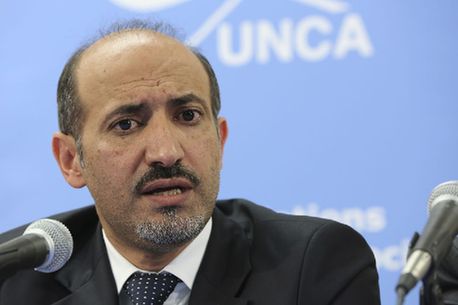China's Syria policy will stand the test of time
- By Jin Liangxiang
 0 Comment(s)
0 Comment(s) Print
Print E-mail China.org.cn, April 21, 2014
E-mail China.org.cn, April 21, 2014
In the middle of April, a delegation of the Syrian National Coalition headed by Ahmad Jarba visited Beijing, and was met with Chinese foreign minister Wang Yi. This latest development once again signifies China's policy and role in the Syrian issue. Despite some modest dissatisfaction, China's policy will stand the test of time.
|
|
|
Ahmad Jarba [File photo] |
It is true that China's Syria policy used to be the target of criticism. China vetoed three UN Security Council resolutions, which might have led to external intervention into Syria's domestic affairs. China was dissatisfied not only by Syrian oppositions but also by regional actors who expected to see the demise of Bashar Assad's regime. But what determines good policy is whether it can stand the test of time rather than whether it is criticized. Good policy does not necessarily please all.
Though both China and Russia opposed military intervention, the start points of the two were different. Russia was actually acting more out of geopolitical interests. Looking at a map, Syria is actually two or three hours' flight away from Moscow. And Syria has long been a staunch ally of Russia as well. Without an alliance with Syria, Russia would have a much weaker role in the region.
China's Syria policy stems from its adherence to the principle of non-intervention. As is evident in history, external intervention has been a problem itself rather than a solution to a problem. China believes that military intervention itself and the anarchy as a result of it could cause much a more serious humanitarian crisis than the internal clashes. For instance, the casualties as a result of Qaddafi's persecution and repression could be counted in the tens of thousands, but the war launched by the West and the post-war anarchy could have produced hundreds of thousands of deaths. It is ironic that the former U.S. ambassador also fell as a victim of the post-war anarchy.
China also believes that external intervention can often be employed by the West or the most powerful as an instrument to achieve political purposes. It is widely accepted in the non-Western world that by changing Libya's regime, the West actually wanted to change its anti-West foreign policy.
In Syria's case, civil war has caused approximately 150 thousand casualties and millions of displaced refuges. But military actions from outside could cause even more deaths. And the West actually aims to gain geopolitical benefits through intervention. It is because of Bashar Assad's alliance with Iran rather than the authoritarian nature of the regime itself that the West wants to topple it. If not, why would the West not intervene in countries with a similar situation?






